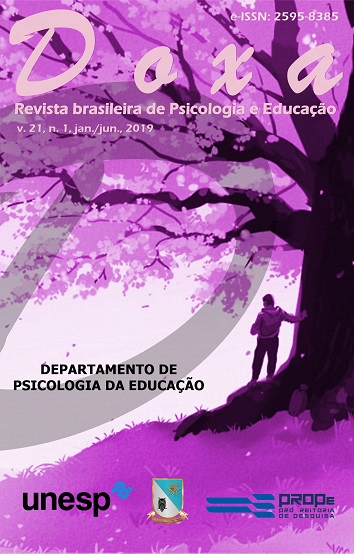The importance of educational affectiveness
DOI:
https://doi.org/10.30715/doxa.v21i1.12003Keywords:
Learning, Affectivity, Bond, School.Abstract
Affectivity is a human psychological state, so it is part of schooling and the teaching-learning process. The aim of this article is to demonstrate how and why affectivity is linked to the teaching-learning process, emphasizing that without the establishment of affective bonds, it is not possible for the learner to provide energy so that his desire to learn is manifested. In this way, it is possible to affirm that there will be no learning if there is no cognitive and affective development, concomitantly. The affectivity has been the subject of study by many authors, and all are unanimous in stating that integral human development must have cognition affection. Not infrequently, we find children who do not learn or who do not wish to learn since they are unable to establish affective bonds with the school and with teachers. The school is the first living environment away from parents and family, so it should be welcoming and amenable to affective development.Downloads
References
ALMEIDA, A. R. S. A emoção e o professor: um estudo à luz da teoria de Henri Wallon. Psicologia: Teoria e Pesquisa, v. 13, n. 2, p. 239-249, 1997.
ALMEIDA, A. R. S. As emoções na sala de aula. Campinas, SP: Ed. Papirus, 1999.
COSTA, K. S. da; SOUZA, R. K. M. de. O aspecto sócio-afetivo no processo ensino-aprendizagem na visão de Piaget, Vygotkky e Wallon. Disponível em: http://www.educacaoonline.pro.br/index.php?option=com_content&view=article&id=299:oaspecto-socio-afetivo-no-processo-ensino-aprendizagem-na-visao-de-piaget-vygotskyewallon&catid=4:educacao&Itemid=15. Acesso em: 19 nov. 2018
DEWEY, J. A Escola e a Sociedade/ A criança e o currículo. Editora Relógio D’água, 2002. Ano copyright, 1902.
DEWEY, J. Democracia e Educação. 3. ed. São Paulo: Nacional, 1959.
FONSECA, V. Neuropsicologia: cérebro, corpo e motricidade. Rev Psique: Ciência Vida, 2016; 123 (dossier: Enigmático Cérebro), p. 37-53.
FONSECA, V. Dificuldades de aprendizagem não verbais. Rev. Inclusão, 2000; v. 1, p. 89-112.
FREIRE, P. Pedagogia da Autonomia: Saberes necessários à prática educativa. São Paulo: Paz e Terra, 1996.
GOLEMAN, D. Inteligência emocional: a teoria revolucionária que redefine o que é ser inteligente. Rio de Janeiro: Objetiva, 2012.
GOLEMAN, D. O cérebro e a inteligência emocional: novas perspectivas. Rio de Janeiro: Objetiva, 2012.
LORENZONI, N. V. Vínculo Afetivo e Aprendizagem. Porto Alegre, EST, 2004.
OLIVEIRA, M. K. de. O problema da afetividade em Vygotsky. In: LA TAILLE, Y.; DANTAS, H.; OLIVEIRA, M. K. Piaget, Vygotsky e Wallon: teorias psicogenéticas em discussão. São Paulo: Summus Editorial Ltda, 1992.
PIAGET, J. A epistemologia genética. Trad. Nathanael C. Caixeira. Petrópolis: Vozes, 1971.
PIAGET, J.; INHELDER, B. A psicologia da criança. 11. ed. Rio de Janeiro: Bertrand Brasil, 1990.
PIAGET, J. Para Onde Vai a Educação? Rio de Janeiro: José Olympo , 9. ed., 1988.
SNYDERS, G. Alunos felizes. São Paulo: Paz e terra, 1993.
TEIXEIRA, A. Pequena introdução à filosofia da educação - escola progressiva ou a transformação da escola. 6. ed. Rio de Janeiro: DP&A Editora, 2000.
VAN DER VEER, R.; VALSINER, J. Vygostsky: uma síntese. São Paulo: Unimarco/Loyola, 1996.
VYGOTSKY, L. S. Pensamento e Linguagem. São Paulo: Martins Fontes, 1993.
VYGOTSKY, L. S. O desenvolvimento psicológico na infância. São Paulo: Martins Fontes, 1998.
WALLON, H. As origens do caráter na criança. São Paulo: Difusão Europeia, 1971.
WALLON, H. A evolução psicológica da criança. Lisboa, Persona/Martins Fontes, 1968.
WALLON, H. Psicologia. Weber M. J. S.; Brulfert J. N. (org.). São Paulo, Ática, 1986.
WALLON, H. Psicologia e Educação da Infância. Lisboa: Estampa, 1975.
ROURKE B. Nonverbal learning disabilities: the syndrome and the model. New York: Guilford; 1989.










